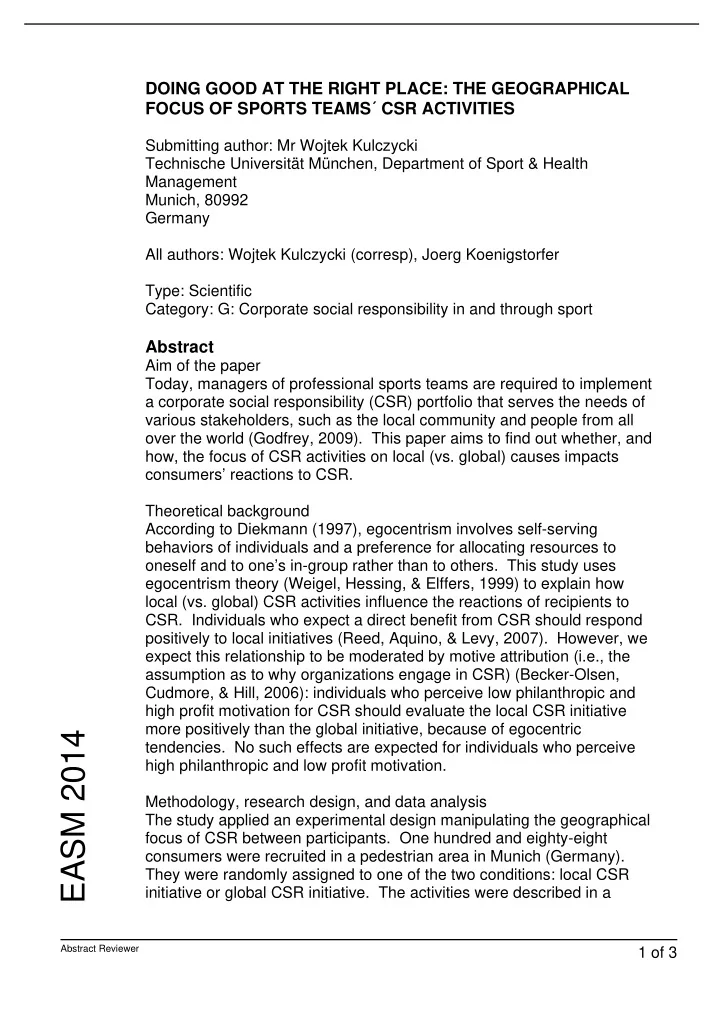

DOING GOOD AT THE RIGHT PLACE: THE GEOGRAPHICAL FOCUS OF SPORTS TEAMS´ CSR ACTIVITIES Submitting author: Mr Wojtek Kulczycki Technische Universität München, Department of Sport & Health Management Munich, 80992 Germany All authors: Wojtek Kulczycki (corresp), Joerg Koenigstorfer Type: Scientific Category: G: Corporate social responsibility in and through sport Abstract Aim of the paper� Today, managers of professional sports teams are required to implement a corporate social responsibility (CSR) portfolio that serves the needs of various stakeholders, such as the local community and people from all over the world (Godfrey, 2009). This paper aims to find out whether, and how, the focus of CSR activities on local (vs. global) causes impacts consumers’ reactions to CSR. � � Theoretical background� According to Diekmann (1997), egocentrism involves self-serving behaviors of individuals and a preference for allocating resources to oneself and to one’s in-group rather than to others. This study uses egocentrism theory (Weigel, Hessing, & Elffers, 1999) to explain how local (vs. global) CSR activities influence the reactions of recipients to CSR. Individuals who expect a direct benefit from CSR should respond positively to local initiatives (Reed, Aquino, & Levy, 2007). However, we expect this relationship to be moderated by motive attribution (i.e., the assumption as to why organizations engage in CSR) (Becker-Olsen, Cudmore, & Hill, 2006): individuals who perceive low philanthropic and high profit motivation for CSR should evaluate the local CSR initiative more positively than the global initiative, because of egocentric EASM 2014 tendencies. No such effects are expected for individuals who perceive high philanthropic and low profit motivation.� � Methodology, research design, and data analysis� The study applied an experimental design manipulating the geographical focus of CSR between participants. One hundred and eighty-eight consumers were recruited in a pedestrian area in Munich (Germany). They were randomly assigned to one of the two conditions: local CSR initiative or global CSR initiative. The activities were described in a Abstract Reviewer 1 of 3
fictitious press release that was shown to the participants first. The press release reported about a drug prevention program that was initiated by the soccer team FC Bayern Munich. In the local (global) CSR condition, the inhabitants of Munich (world population) were described to be the target group of the program. After participants had read the press release, they responded to a questionnaire including the following key dependent variables: CSR perception, attitude towards the team, and behavioral intention to remain loyal towards the team. A manipulation check and motive attribution were assessed. All variables were measured on established multi-item scales with satisfying validity and reliability.� � Results, discussion, and implications� The manipulation check was successful: participants evaluated the local character of the local CSR initiative higher than for the global initiative (MGlobal = 2.15, MLocal = 3.48; t(187) = 7.88, p < .001; the item was measured on a five-point rating scale). To test our hypotheses, a moderated regression analysis was conducted using the manipulation, motive attribution (mean-centered), and their interaction as independent variables. CSR perception, attitude towards the team, and loyalty intentions were treated as dependent variables. The two-way interactions between the manipulation and the motive attribution were significant as regards the effects on CSR perception (b = –0.18, SE = 0.09, p = .043), attitude towards the team (b = –0.37, SE = 0.12, p = .002), and loyalty intentions (b = –0.27, SE = 0.12, p =.028). � The interactions describe different patterns of effects for global and local CSR activities depending on motive attribution. Participants who perceived the CSR activities to be motivated by profit reasons evaluated the local CSR initiative more positively than the global CSR initiative. This supports our assumption of self-serving tendencies in individuals who presume profit to be the driving force for CSR. Participants who perceived CSR activities to be motivated by philanthropic reasons did not differ in their evaluation of the sports team. Beside the significant interaction effect, we found a significant main effect of motive attribution on the dependent variables, confirming previous findings in the literature that higher perception of philanthropic motives for CSR (and lower perception of profit motives for CSR) leads to more positive brand evaluations (Becker-Olsen, et al., 2006).� EASM 2014 To our knowledge, this is the first study to provide evidence about the effects of a CSR initiative’s geographical focus on brand evaluation (here: professional sports teams). There were different effects for local and global CSR initiatives at low levels of philanthropic motive attribution: these consumers evaluated local (vs. global) CSR more positively, because they felt that the environment of their in-group (here: inhabitants) should profit from CSR. The results therefore ask for implementing a CSR portfolio in sports teams that may include both geographical foci, but in which the foci are communicated differently depending on the motive attribution perception by stakeholders. Teams Abstract Reviewer 2 of 3
should highlight local community support if their fans perceive high profit motivation of CSR. References Becker-Olsen, K. L., Cudmore, B. A., & Hill, R. P. (2006). The Impact of Perceived Corporate Social Responsibility on Consumer Behavior. Journal of Business Research, 59(1), 46-53.� Diekmann, K. A. (1997). ‘Implicit Justifications’ and Self‐Serving Group Allocations. Journal of Organizational Behavior, 18(1), 3-16.� Godfrey, P. C. (2009). Corporate Social Responsibility in Sport: An Overview and Key Issues. Journal of Sport Management, 23(6), 698-716.� Reed, A., Aquino, K., & Levy, E. (2007). Moral Identity and Judgments of Charitable Behaviors. Journal of Marketing, 71(1), 178-193.� Weigel, R. H., Hessing, D. J., & Elffers, H. (1999). Egoism: Concept, Measurement and Implications for Deviance. Psychology, Crime and Law, 5(4), 349-378. EASM 2014 Abstract Reviewer 3 of 3
Recommend
More recommend